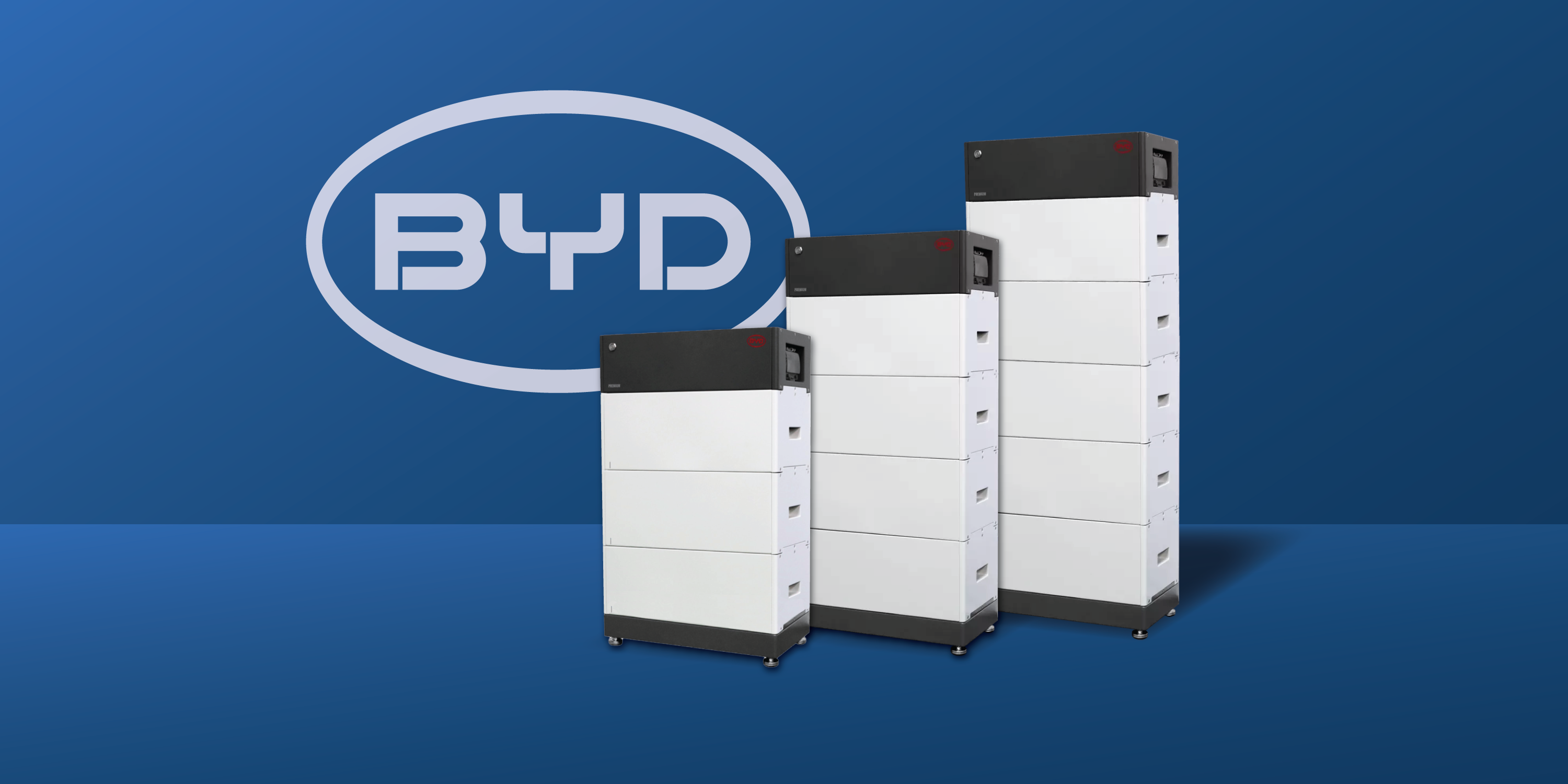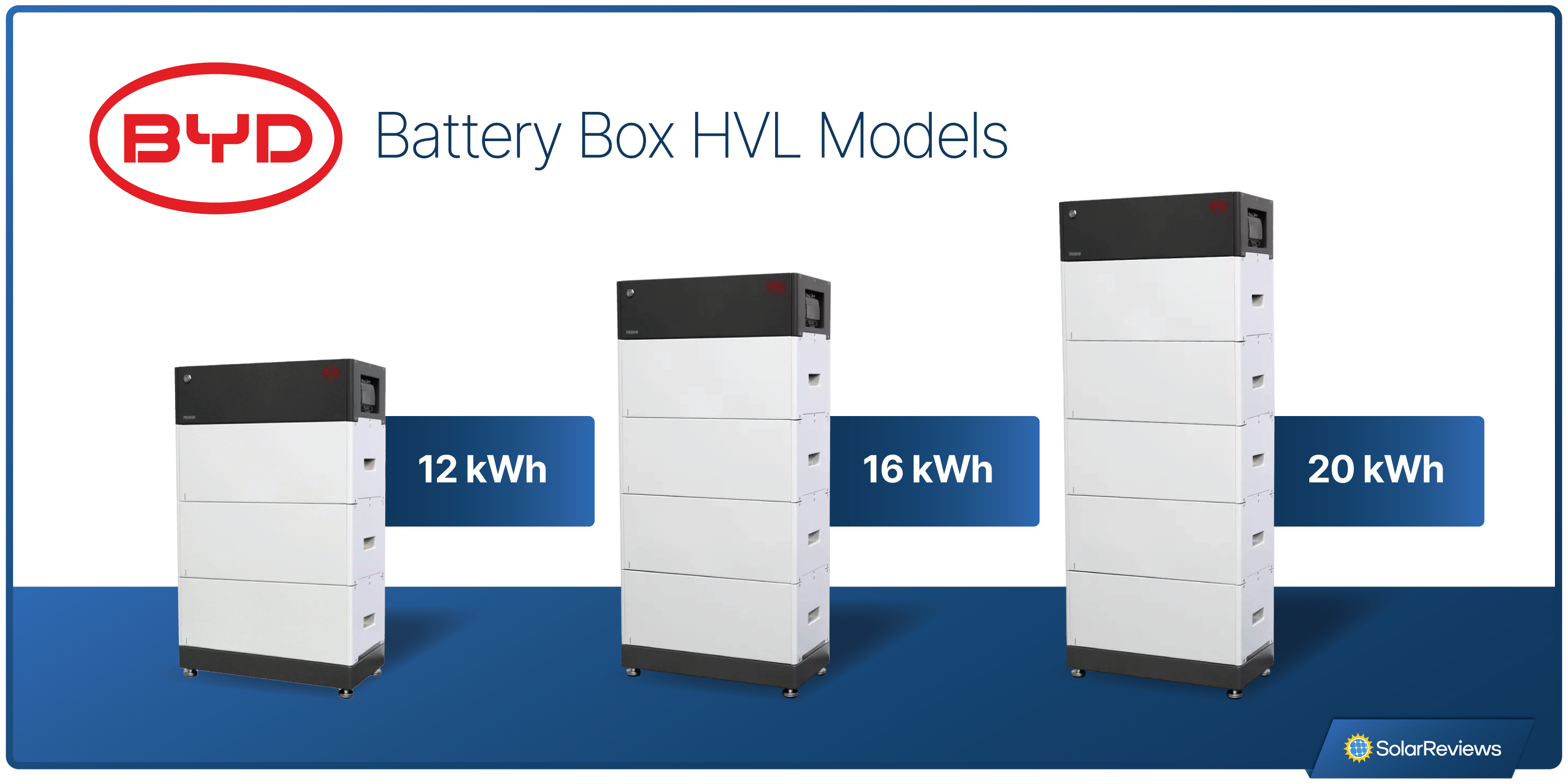Updated 9 months ago
BYD Battery Box HVL expert review: cost, specs, and availability
Written by
Ben Zientara

Find out what solar batteries cost in your area
Key facts about the BYD Battery Box
-
The BYD Battery Box HVL is a modular home solar battery from one of the world’s largest battery cell manufacturers.
-
The system consists of 4 kWh battery modules, which can be stacked from 3 to 8 high under the BYD Battery Control Unit (BCU).
-
The Battery Box HVL is a DC-coupled battery, meaning it is charged directly from solar panel output and must be paired with a hybrid solar inverter from either SMA, Solis, or GoodWe to be usable in a home.
-
The BYD battery is affordable, at an estimated installed cost of $11,000 for an average-sized system.
-
We think the BYD battery box is one of the best DC-coupled batteries available, and we’re pleased that it’s offered by a successful company with a long history of success.
The BYD Battery Box HVL is one of the newer batteries in the U.S. and Canada home solar market.
Like many other home solar batteries, it is made up of stackable battery modules that connect together under a battery control unit, allowing homeowners to get a system that’s custom-sized to fit their energy needs and expandable if those needs ever change.
Unlike other batteries on the market, the BYD solution comes directly from the manufacturer of the battery cells that go inside it, making this battery more affordable than many other options. Its low cost helped it earn 10th place on our Best Solar Batteries of 2025 list.
Installing a BYD Battery Box HVL costs around $11,000, bringing the total cost for an average-sized solar installation with a BYD battery to about $30,000.
But does that affordability make the BYD Battery Box HVL the right choice for you?
Our verdict on the BYD Battery Box HVL
In our roundup of the best home solar batteries, the BYD Battery Box is among our top picks for DC-coupled home solar batteries because of its relatively low price point, easy pairing with multiple inverter options, and BYD’s financial performance.
Pros
-
Flexible capacity sizes from 12 to 96 kilowatt-hours
-
Low cost compared to other options
-
Comes from a very successful company with thousands of batteries sold worldwide
Cons
-
Difficult to pair with existing solar installations
-
Not compatible with the most popular inverter brands
-
Warranty coverage isn’t as good as the best batteries on the market
The BYD Battery Box is best for installation alongside a new home solar system because it must be paired with a hybrid solar inverter. And your choice of inverters is limited to just three companies: SMA, Solis, and GoodWe.
If you already have solar panels installed, opt for an AC-coupled solar battery like the Enphase IQ 5P.
Only 3% of solar installers that responded to our 2025 Solar Industry Survey reported using BYD batteries, however, the brand is still relatively new in the U.S. market. BYD has a proven track record in other markets, such as Australia and Asia.
BYD Battery Box HVL components and functionality

The Battery Box HVL is a modular energy storage system that consists of two main components:
Battery modules with 4 kWh of energy storage capacity each.
A Battery Control Unit (BCU), which manages the charging and discharging of the batteries.
The Battery Box HVL is installed in a floor-mounted, wall-supported configuration. Between 3 and 8 battery modules are stacked on top of a floor-mounting base, and the BCU is connected to the top of the stack. Each module stores 4 kWh of usable electricity.
As the number of battery modules increases, so does the system's capacity and power output. Up to three stacks can be wired in parallel, so the capacity range of a single Battery Box HVL installation is 12 to 96 kWh. That’s a huge amount of flexibility!
Importantly, the Battery Box HVL is a DC-coupled battery, so it must be paired with a hybrid solar inverter.
BYD has only three currently approved inverter manufacturers: SMA, GoodWe, and Solis. According to our solar industry statistics, U.S. solar installers choose SMA as the fifth most popular solar inverter brand, while GoodWe and Solis have smaller market share but make fine products.
Still, if you have your heart set on Enphase microinverters (used in the majority of U.S. home solar installations), you’ll have to look elsewhere for a battery.
BYD Battery Box HVL specifications | |
|---|---|
Energy capacity | 12 - 96 kWh |
Max. continuous power output | 50 A (voltage varies by # of batteries, limited to 11.4 kW based on inverter pairing) |
Approximate cost (pre-installation) | $690/kWh |
Battery chemistry | Lithium iron phosphate (LFP) |
Coupling | DC coupled |
Dimensions | 39.2 x 23.0 x 11.7 inches to 85.0 x 23.0 x 11.7 inches per stack (H x W x D) |
Weight | 330.7 lbs to 826.7 lbs per stack (Each battery module weighs 99.2 lbs) |
Warranty details | Will retain at least 70% of original capacity until more than 2.525 MWh total energy throughput per kWh of storage or 10 years |
Additional features | IP55 (outdoor-rated) floor-mounted enclosure. Requires inverter for use in the home. |
More information | |
How much does the BYD Battery Box cost?
Based on our knowledge of average installation costs, we estimate that a 16 kWh BYD Battery Box HVL would add around $11,000 to the cost of a solar system from an installer. We say “in addition” because this system would not be installed in a standalone configuration.
BYD Battery Box HVL batteries are moderately priced compared to some other offerings on the market, and we’ve also seen deals in the retail pricing. Recent retail sales show prices as low as $8,140 for a 16-kWh battery at EcoDirect, but most people will likely buy a BYD battery as part of a solar plus storage system from an installation company.
The average cost of a solar panel system without a battery would be around $19,000, so the same system with a 16 kWh BYD Battery Box HVL would be around $30,000.
Note: These prices are before the federal solar tax credit and other solar incentives. If you qualify to claim the federal credit, you can receive 30% of the cost to install solar panels and batteries back from the federal government when you file taxes the next year. State storage rebates and incentives can reduce that cost even further.
BYD’s solar battery warranty
BYD’s warranty for the Battery Box HVL is decent but not spectacular. It provides 10 years of protection against defects in materials and workmanship and also includes a promise that the battery will retain at least 70% of its usable energy capacity for 10 years, or until the total energy throughput reaches 2.525 megawatt-hours (MWh) per kWh of storage.
So, for example, a 16 kWh Battery Box HVL battery stack would have a total energy throughput limit of 40.40 MWh. If you discharged that much energy from the battery before 10 years is up, the warranty would expire.
These numbers are lower than the best on the market, in which some companies offer 15 years of coverage and up to 4.15 MWh per kWh of throughput. Considering BYD is such a big company, we’d like to see them increase their warranty terms, but the company’s success does speak well of its ability to stick around for the10 years.
About BYD
BYD is a publicly traded company founded in 1995 and headquartered in Shenzhen, China. The company is most well-known for its electric vehicle batteries, which power many brands of electric cars and buses, including BYD’s own. In 2023, BYD held a 41% market share for LFP batteries in China.
Although the company’s home battery is relatively new to the U.S. and Canada, BYD has sold hundreds of thousands of solar batteries in other parts of the world, especially in Australia.
Ben Zientara is a writer, researcher, and solar policy analyst who has written about the residential solar industry, the electric grid, and state utility policy since 2013. His early work included leading the team that produced the annual State Solar Power Rankings Report for the Solar Power Rocks website from 2015 to 2020. The rankings were utilized and referenced by a diverse mix of policymakers, advocacy groups, and media including The Center...
Learn more about Ben Zientara